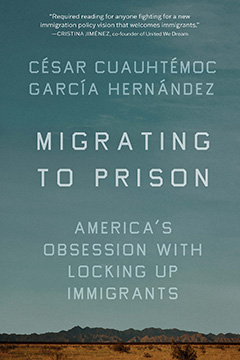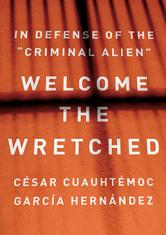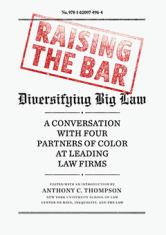“César Cuauhtémoc García Hernández’s Migrating to Prison uncovers the history of U.S. immigrant detention, from the 1980s to the present.”—Bustle |
“Migrating to Prison makes the persuasive case that the astronomical boom in imprisonment of immigrants stems from exactly the same root causes, both financial and political, as the dramatic escalation in mass incarceration.”—The Baffler |
“Essential for anyone trying to understand how the United States came to have the world’s largest detention infrastructure. García Hernández does a masterful job of laying out the turning points of immigration imprisonment from Ellis Island to family separation and the case for abolishing the practice altogether.”—Silky Shah, executive director of Detention Watch Network |
“At a time when child migrant camps and family separations have drawn the attention of Americans, Migrating to Prison provides a vital road map to understand how the immigrant detention industry has evolved over the years. A critical and accessible primer for anyone interested in understanding the system—and abolishing it.”—Deepa Iyer, author of We Too Sing America |
“Migrating to Prison rips the veils off of the immigration detention system. García Hernández brings a sharp legal eye to showing how our immigration system has become so twisted that we take for granted the outrageous. If you want a crystal clear explanation of why we need to abolish immigration detention, this is the book for you.”—Aviva Chomsky, author of Undocumented |
“A chilling, timely overview of the American tendency to first exploit and then criminalize migrants. . . . García Hernández counters pessimism with in-depth research and measured, passionate argument. An effective jeremiad on a key moral controversy of the Trump era.”—Kirkus Reviews |
“Exuding humanity, insight, and forbearance, García Hernández offers a concise and powerful look at a complex and perplexing challenge.”—Booklist |
“An immigration lawyer takes the U.S. immigration imprisonment system to task in this passionate, credible treatise.”—Shelf Awareness |
“In tracing the history behind today’s record levels of imprisonment, García Hernández reveals the haphazard ways immigration enforcement has been devised and administered, how supremacist notions of nationalism and race have long guided our policymaking, and how adherence to procedural guidelines was gradually reframed as a question of criminality.”—The New York Review of Books |
|
“Timely, informative, expertly written, organized and presented, Migrating to Prison: America’s Obsession with Locking Up Immigrants is unreservedly recommended.”—The Midwest Book Review |
“Required reading for anyone fighting for a new immigration policy vision that welcomes immigrants. We need to understand the sadistic, multibillion-dollar industry of immigrant detention so that we can rip it down and make sure it never comes back.”—Cristina Jiménez, co-founder of United We Dream |
“García Hernández provides an insightful examination of the eerie parallels between immigration imprisonment and mass incarceration. He makes a compelling argument that criminalizing immigration enforcement is not only a seriously flawed practical strategy, but an affront to human rights as well.”—Marc Mauer, executive director of The Sentencing Project and author of Race to Incarcerate |
“A ‘must-read’ for any American interested in the tragic humanitarian impacts of the mass detention of immigrants as a central tool in contemporary immigration enforcement. García Hernández writes cogently, intelligently, and passionately about the increasingly expansive use of detention to regulate immigration. The book could not be more timely.”—Kevin R. Johnson, dean, University of California, Davis, School of Law |
“An accessible history and fierce critique of the U.S. immigration system. . . . His thoughtful mixture of reportage and legal scholarship makes for an important entry in the immigration debate.”—Publishers Weekly |
“A thought-provoking perspective on immigration and U.S. immigration policy.”—Library Journal (starred review) |
“[García Hernández] argues compellingly that immigrant advocates shouldn’t content themselves with debates about how many thousands of immigrants to lock up, or other minor tweaks.”—Gus Bova, Texas Observer |
“Hernández lays out in a lucid, linear fashion the evolution of immigration law and its enforcement in the United States.”—The Intercept |
|






